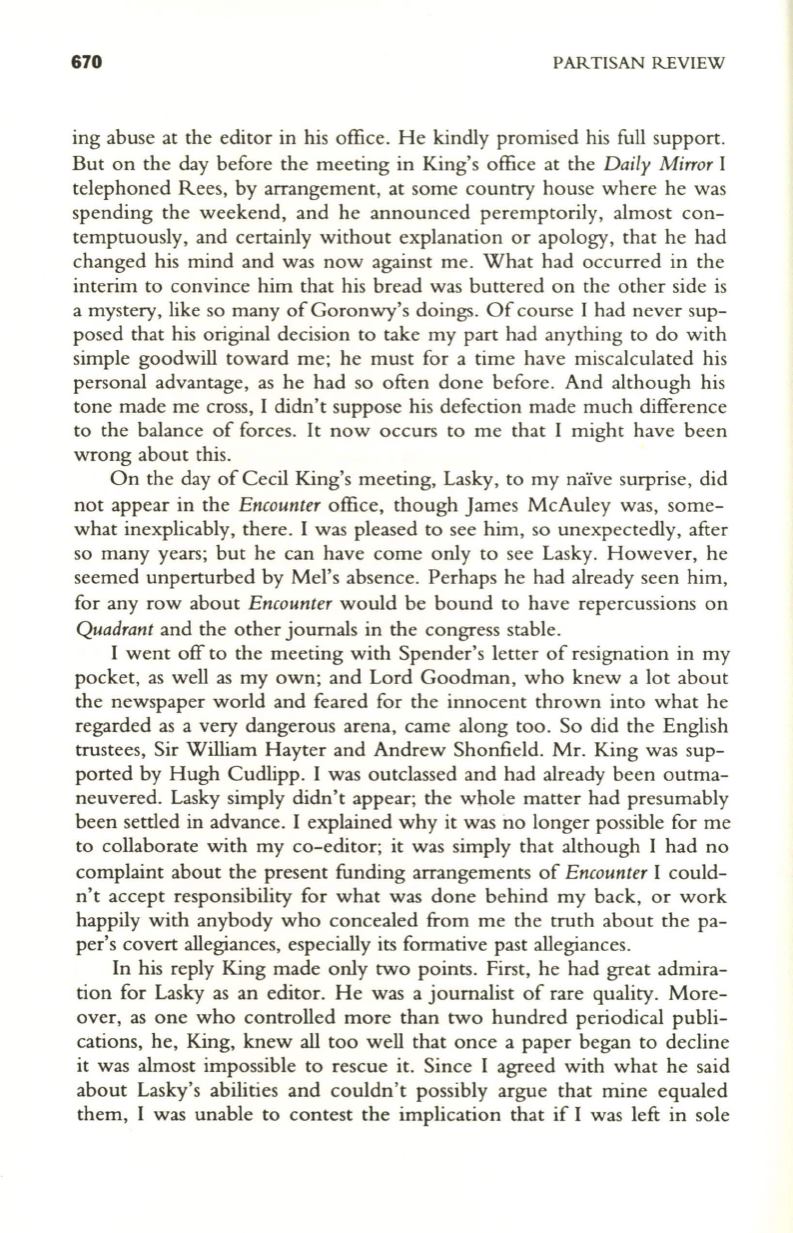
670
p
ARTISAN REVIEW
ing abuse at the editor in his office. He kindly promised his full support.
But on the day before the meeting in King's office at the
Daily Mirror
I
telephoned Rees, by arrangement, at some country house where he was
spending the weekend, and he announced peremptorily, almost con–
temptuously, and certainly without explanation or apology, that he had
changed his mind and was now against me. What had occurred in the
interim to convince him that his bread was buttered on the other side is
a mystery, like so many of Goronwy's doings. Of course I had never sup–
posed that his original decision to take my part had anything to do with
simple goodwill toward me; he must for a time have miscalculated his
personal advantage, as he had so often done before. And although his
tone made me cross, I didn't suppose his defection made much difference
to the balance of forces. It now occurs to me that I might have been
wrong about this.
On the day of Cecil King's meeting, Lasky, to my naive surprise, did
not appear in the
Encounter
office, though James McAuley was, some–
what inexplicably, there. I was pleased to see him, so unexpectedly, after
so many years; but he can have come only to see Lasky. However, he
seemed unperturbed by Mel's absence. Perhaps he had already seen him,
for any row about
Encounter
would be bound to have repercussions on
Quadrant
and the other journals in the congress stable.
I went off to the meeting with Spender's letter of resignation in my
pocket, as well as my own; and Lord Goodman, who knew a lot about
the newspaper world and feared for the innocent thrown into what he
regarded as a very dangerous arena, came along too. So did the English
trustees, Sir William Hayter and Andrew Shonfield. Mr. King was sup–
ported by Hugh Cudlipp. I was outclassed and had already been outma–
neuvered. Lasky simply didn't appear; the whole matter had presumably
been settled in advance. I explained why it was no longer possible for me
to collaborate with my co-editor; it was simply that although I had no
complaint about the present funding arrangements of
Encounter
I could–
n't accept responsibility for what was done behind my back, or work
happily with anybody who concealed from me the truth about the pa–
per's covert allegiances, especially its formative past allegiances.
In his reply King made only two points. First, he had great admira–
tion for Lasky as an editor. He was a journalist of rare quality. More–
over, as one who controlled more than two hundred periodical publi–
cations, he, King, knew all too well that once a paper began to decline
it was almost impossible to rescue it. Since I agreed with what he said
about Lasky's abilities and couldn't possibly argue that mine equaled
them, I was unable to contest the implication that if I was left in sole


